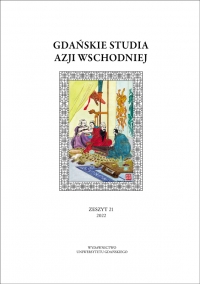Format Quad jako narzędzie Stanów Zjednoczonych w rywalizacji z Chińską Republiką Ludową
Abstrakt
In the last years, international tensions in the Indo-Pacific region have become more frequent and intense. Some of them are caused by the spectacular economic growth of the People’s Republic of China in the last 40 years, which implies Beijing’s increasingly assertive stance on the international stage and the growth of China’s military power. To counterbalance the growing power of the People’s Republic of China, Indo-Pacific countries will steadily increase their focus on opportunities to operate in the framework of multilateral formats. One of them is Quadrilateral Security Dialogue (Quad), which includes Australia, India, Japan, and the United States. The Quad group, due to the potential of its members, has a chance to become a format that will effectively inhibit China from potential aggressive actions in the Indo-Pacific region. However, because of the existing disparities within the Quad countries, as well as the ongoing rivalry between Beijing and Washington for world supremacy, the United States may use the format too instrumentally. The success of the Quad group in the future will be determined by US’s attitude related to the partnership-based treatment of the other three format members.
Downloads
Bibliografia
Andressen C., Krótka historia Japonii. Od samurajów do SONY, tłum. A. Śledzińska, Warszawa 2009.
Bendyk E., W Polsce, czyli wszędzie. Rzecz o upadku i przyszłości świata, Warszawa 2020.
Bogusz M., AUKUS: nowy format bezpieczeństwa na Pacyfiku wymierzony w Chiny, Ośrodek Studiów Wschodnich, 20.09.2021, https://www.osw.waw.pl/pl/publikacje/analizy/2021-09-20/aukus-nowy-format-bezpieczenstwa-na-pacyfiku-wymierzony-w-chiny (dostęp: 10.03.2022).
Chen J., Bretton Woods Agreement and System, Investopedia, https://www.investopedia.com/ (dostęp: 10.04.2022).
Clinton H., America’s Pacific Century, Foreign Policy, https://foreignpolicy.com/2011/10/11/americas-pacific-century/ (dostęp: 13.04.2022).
Domżalski S., Indie w gospodarce światowej. Słoń, który pragnął latać, Warszawa 2017.
Fornalczyk J., Chiny w procesie modernizacji – przemiany gospodarczo-społeczne [w:] Współczesne Chiny. Kultura, polityka, gospodarka, red. M. Pietrasiak, Łódź 2005.
Gacek Ł., Cywilizacja ekologiczna i transformacja energetyczna w Chinach, Poznań 2020.
Gacek Ł., Wielka strategia Chin – implikacje dla państw sąsiednich [w:] Azja Wschodnia i Azja Południowa w stosunkach międzynarodowych. Bezpieczeństwo – gospodarka – cywilizacja, red. J. Nakonieczna, J. Zajączkowski, Warszawa 2011.
Gamble R., Davis A., The Big Lesson of the India-China Conflict: Borders Don’t Work at High Altitude, „The Diplomat”, 23.06.2020, https://thediplomat.com/2020/06/the-big-lesson-of-the-india-china-conflict-borders-dont-work-at-high-altitude/ (dostęp: 25.04.2022).
Godement F., Czego chcą Chiny?, tłum. K. Sarek, Warszawa 2016.
Góralczyk B., Wielki Renesans. Chińska transformacja i jej konsekwencje, Warszawa 2018.
Grant S., Dziedzic S., Xiao B., Everything you want to know about Australia-China trade war but were too afraid to ask, ABC News, 10.12.2020, https://www.abc.net.au/news/2020-12-10/china-australia-trade-war-your-questions-answered/12971434 (dostęp: 20.04.2022).
Haliżak E., Polityka i strategia Chin w kształtowaniu międzynarodowego bezpieczeństwa, Warszawa 2007.
Huang Y., Capitalism with Chinese Characteristics. Entrepreneurship and the State, Cambridge – New York 2007.
India bans PUBG, Baidu and more than 100 apps linked to China, BBC News, 2.09.2020, https://www.bbc.co.uk/news/technology-53998205 (dostęp: 25.042022).
Institute for Security & Development Policy, Amending Japan’s Pacifist Constitution, April 2018, https://isdp.eu/content/uploads/2018/04/Amending-Japan%E2%80%99s-Pacifist-Constitution.pdf (dostęp: 25.03.2022).
Jian X., Wspólnie budując Jedwabny Szlak XXI wieku, promujemy i zacieśniamy przyjaźń [w:] Chiny i świat zewnętrzny, red. J. Marszałek-Kawa, Toruń 2016.
Kissinger H., O Chinach, tłum. M. Komorowska, Wołowiec 2014.
Kung C., Jun H., Australia-China Economic and Trade Relations Are Heading for a Hard Reset, „The Diplomat”, 16.12.2020, https://thediplomat.com/2020/12/australia-china-economic-and-trade-relations-are-heading-for-a-hard-reset/ (dostęp: 20.04.2022).
Kwieciński R., Chiny na drodze do potęgi morskiej? [w:] Bliżej Azji. Współczesne wyzwania dla bezpieczeństwa, red. Ł. Gacek, R. Kwieciński, E. Trojnar, Warszawa 2017.
Lee K.-F., Inteligencja sztuczna, rewolucja prawdziwa. Chiny, USA i przyszłość świata, tłum. K. Hejwowski, Poznań 2019.
Mierzejewski D., W pułapce współzależności. Dylematy wyboru narzędzi w amerykańskiej polityce ChRL [w:] Narzędzia polityki zagranicznej Chińskiej Republiki Ludowej, red. M. Pietrasiak, D. Mierzejewski, K. Żakowski, Łódź 2014.
Monahan A., China Overtakes Japan as World’s No. 2 Economy, „The Wall Street Journal”, 14.02.2011, https://www.wsj.com/articles/SB10001424052748703361904576142832741439402(dostęp: 20.04.2022).
Naughton B., The Chinese Economy: Transitions and Growth, Cambridge, Mass. – London 2007.
Needham K., Australia welcomes growing support for COVID-19 inquiry at WTO meeting, Reuters, https://www.reuters.com/article/us-health-coronavirus-who-australia-idUSKBN22U0OP (dostęp: 13.04.2022).
Nguyen H.T., AIIB as a Challenger for IMF and WB, „American International Journal of Business Management” 2019, vol. 2, no. 19, s. 62–68.
Okraska T., Słoń w pogoni za smokiem. Stosunki indyjsko-chińskie w zmieniającym się świecie, Toruń 2019.
Pandit R., Malaber exercise of ‘Quad’concludes with clear message for China, „The Times of India”, 20.11.2020, https://timesofindia.indiatimes.com/india/malabar-exercise-of-quad-concludeswith-clear-message-for-china/articleshow/79325408.cms (dostęp: 10.03.2022).
Perlez J., Pence’s China Speech Seen as Portent of ‘New Cold War’, „The New York Times”, https://www.nytimes.com/2018/10/05/world/asia/pence-china-speech-cold-war.html (dostęp: 25.04.2022).
Pillsbury M., The Hundred-Year Marathon. China’s secret strategy to replace America as the global superpower, New York 2016.
Shubhajit R., India, Japan to engage in 2+2 dialogue today, „The Indian Express”, 30.11.2019, https://indianexpress.com/article/india/india-japan-to-engage-in-22-dialogue-today-6143422/ (dostęp: 13.03.2022).
Silver C., The Top 25 Economies in the World, Investopedia, https://www.investopedia.com/insights/worlds-top-economies/ (dostęp: 15.05.2022).
Slezak M., Bogle A., Huawei banned from 5G mobile infrastructure rollout in Australia, ABC News, 23.08.2018, https://www.abc.net.au/news/2018-08-23/huawei-banned-from-providing-5g--mobile-technology-australia/10155438 (dostęp: 20.03.2022).
Sprengel M., Gospodarczo-polityczne współczesne relacje Australii i Japonii. Wzorzec dla stosunków międzynarodowych w regionie Azji i Pacyfiku, Kraków 2012.
Statista, Countries with the highest military spending in 2019, https://www.statista.com/statistics/262742/countries-with-the-highest-military-spending/ (dostęp: 25.03.2022).
World Bank, Comparing United States and China by Economy, „Statistics Times”, 15.05.2021, https://statisticstimes.com/economy/united-states-vs-china-economy.php (dostęp: 13.03.2022).
The Observatory of Economic Complexity, Where does China import Iron Ore from? (2019), https://oec.world/en/visualize/tree_map/hs92/import/chn/show/52601/2019/ (dostęp: 25.04.2022).
The White House, Joint Statement from Quad Leaders, 24.09.2021, https://www.whitehouse.gov/briefing-room/statements-releases/2021/09/24/joint-statement-from-quad-leaders/ (dostęp: 13.05.2022).
The White House, Quad Joint Leaders’Statement, 24.05.2022, https://www.whitehouse.gov/briefing-room/statements-releases/2022/05/24/quad-joint-leaders-statement/ (dostęp: 24.05.2022).
Wardęga J., Chiński nacjonalizm. Rekonstruowanie narodu w Chińskiej Republice Ludowej, Kraków 2014.
White H., Samodzielność strategiczna. Jak bronić Australii, tłum. G. Kuśnierz, Opole 2019.
Zaheena R., What is the Quad and can it counter China’s rise?, „Al Jazeera”, 25.11.2020, https://www.aljazeera.com/news/2020/11/25/what-is-the-quad-can-us-india-japan-and-australia-deterchina (dostęp: 20.11.2021).
Zhang J., Tiezzi S., Harry Harding on the US, China, and a ‘Cold War 2.0’, „The Diplomat”, 21.10.2020, https://thediplomat.com/2020/10/harry-harding-on-the-us-china-and-a-cold-war-2-0/(dostęp: 15.03.2022).

 Uniwersyteckie Czasopisma Naukowe
Uniwersyteckie Czasopisma Naukowe





